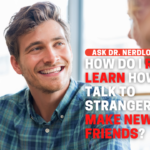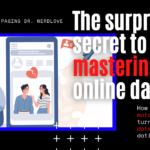We talk a lot about the importance of developing your social skills. However, one of the mistakes I see people make over and over again is how often they focus on the flashier skills; the ones that seem bigger or more impressive. People will, for example, get hung up on all the possible ways of approaching someone at a bar, or in the street or at a coffeeshop. But while those skills seem impressive, they’re actually far less important than people realize.
In fact, people get so focused on the flash that they neglect one of the most undervalued social skills imaginable: being a good conversationalist.
No. Seriously. While making approaches or taking people home gets all the attention, being a sterling conversationalist is what makes everything work. What do you think happens after you make the approach? What do you do to get them to want to stick around? The men who do the best with women are men who people love to talk to. If you don’t know how to engage someone intellectually and emotionally, you’re not going to engage with them physically either.
After all, almost every woman alive has been on dates with dudes who spend the entire time talking at them, not with them. Worse, they tend to run into the ones who only want to talk about themselves and never show the slightest interest in their dates.

The truth is that good conversation is a powerful tool. Most of my jobs and my relationships have come about because I’ve had a great time talking with people I’ve just met. A good friend of mine would fall in love with someone specifically because she had amazing conversations with them. Being able to connect with folks on an intimate and intense level is an invaluable skill to have.
Whether you’re networking, making friends or looking for love, being a great conversationalist is a skill you can’t afford to neglect. So let’s talk about what makes you someone people love to talk to.
Make Sure You Make the Right Impression
Being someone that people love to talk to starts before you ever open your mouth. If you want folks to want to talk to you, first you have to make sure you are making a solid first impression. After all, it doesn’t matter if you drop bon mots like South Carolina drops the ball if people think you’re rude, unpleasant, standoffish or just plain uninterested.
It doesn’t matter if you initiate or someone else does; the results are going to be the same. At best, you’re going to get short, polite responses and they’re going to find excuses to be somewhere else. Anywhere else.
Now, I’ve talked before about how important your presentation is when it comes to making a first impression, but connecting with someone is more than just about your style and grooming. It’s about the vibe and energy you put off too. A lot of folks can be desperately lonely and looking to connect on the inside, but on the outside, they’ve got their head buried in their phones. Others… well, others look like they’re annoyed that they’re even there at all.
If you want people to want to talk to you, you want to make sure that your behavior, body language and even your attitude are the ones that draw people in, not push them away.

You’ve likely experienced this yourself on many occasions. Think of the times you’ve seen people who’ve had that magnetic presence. What was it about them that caught your attention and drew you in? How did they make you feel and why? That’s the sort of energy you want to give off to others.
The first and easiest way to draw folks in is also the simplest: you want to convey a sense of genuine interest. People respond best to warmth and friendliness, not arrogance, disdain or the sense that you’re too good to be there. That sense of warmth is an invitation to stick around and get to know you, rather than giving you a brief answer to your opener and sending you on your way.
The problem is that a lot of folks tend to give a less-than-interested vibe, even without meaning to.

This goes beyond just having a resting murder face; it’s little things, like having your phone out or tense, closed off body language. It can even be part of how you look at people; if you come across as being stuck up or judgy, people will prefer to avoid you, rather than talk to you. House and Sherlock are fun to watch on TV, but in reality, nobody wants to be anywhere near them.
You start with having a warm, inviting smile, but you want to convey the sense there is nothing in the world that you would love more than to listen to her life story. That feeling alone can transform an interaction. As I’ve often said: most of the time we meet people who don’t listen, so much as wait for their turn to talk. Wanting to know what someone has to say is like giving them a precious gift — one that’s going to make them want to spend more time with you.
One thing that helps put you in the right headspace is to assume that you and they are already friends. While this seems like woo-woo-manifest-your-dreams horseshit, it’s a powerful psychological technique. By assuming that you’re friends already, that they like you and think you’re interesting, you change how you behave. After all, your expectations are your filter. They color how you see the world. When you assume that someone couldn’t possibly like you, you’re priming yourself to see everything they do in the worst possible light. It doesn’t matter what they say or do; you’ll be convinced that it’s all leading to your getting rejected.
On the other hand, if you assume they already like you, you set yourself up to see everything positively. It helps you relax and be more authentic and more at ease. You don’t have to impress them or perform for them; you can just focus on being in the moment and enjoying yourself. This helps you give that feeling of being an old friend they’ve just met, and encourages them to respond accordingly. We are social animals and we take many of our cues from the folks around us. If someone acts like a friend to us, we’re much more likely to respond to them in the same way.
That, in turn, helps create a feedback loop; your friendliness and warmth relaxes them and encourages them, which brings out their warmth. This ends up encouraging both of you to enjoy the other’s presence.
Speaking of enjoying things…
Broaden Your Conversational Horizons (And Embrace The Small Talk)
I have a very particular pet peeve: people who insist they despise small talk. Small talk is, in and of itself, a form of social lubricant, something that fosters connection and allows you to pivot to other topics. It’s a way of establishing a baseline of commonality and getting to know someone. With friends and family, it’s a way of catching up with someone and finding out what they’ve been up to. With strangers, it’s a way of easing into other subjects as you begin to build a rapport with one another. Studies have found that small talk actually makes people happier; it helps foster that sense of community and shared experience, even if you’re just talking about the weather.
Small talk is, quite frankly, one of the most important parts of having a conversation. It’s the verbal on-ramp that lets you merge seamlessly into the traffic of deeper topics and more personal subjects.

But what gets to me isn’t disliking small talk, per se. It’s that nine times out of ten, it’s not that they hate small talk, it’s that they define small talk as being the stuff they’re not interested in. Many times, small talk is the speed bump that gets in the way of their sharing their very important opinions about the things they think are more important than finding out what people’ve been doing lately.
If you’re someone who hates small talk, it’s worth asking yourself just why you hate it. What do you consider small talk to be and — importantly — do you understand the purpose of small talk? Yeah, you may have topics you’d rather talk about or that you consider more meaningful… but are they important to the point of neglecting this opportunity to start building rapport with someone?
Small talk is all about bridging the gap and finding common ground with people. It’s about establishing a baseline with them that you can use as a reference point, so you know how to build the level of comfort and familiarity you need to discuss more “meaningful” topics. After all, you can’t launch right into questions like “do you ever plan to have kids?” or “do you have a hunch about how you’ll die?” without making things painfully awkward.

A lot of people find small talk uncomfortable because it can be like working without a social script to follow. If you’re dealing with a complete stranger — especially in an interaction without preset expectations, such as a transaction or service — then many times you’re having to improvise. You’re trying to get a conversation started without any idea of who this person is, what they’re about or whether they’ll keep up their end of the interaction. Meanwhile, they’re often feeling just as awkward and uncomfortable as you are and wondering many of the same things. This is where learning to embrace small talk and those “meaningless” moments at the start come in; you’re using them to find those initial, broad moments of commonality.
It helps to think about this as getting the broad outlines of who they are and what makes them tick. If small talk makes you cringe because you have no idea what to say, consider taking a page from the art of improv and look for the CROW: that is, Character, Relationship, Objective and What/Where/When.
Character is simple: who are they? Relationship is equally simple: how do they know the folks around them? Are those friends or strangers? Objective is why they’re here — what makes them tick, what drives them? What/Where/When is about their relationship to the locale; do they come here often, do they live in the area, what brings them around and how long have they been coming here? It can seem like trite or basic, but these getting to know you questions help you sketch out just who they are. Your showing interest in them encourages them to reciprocate and show interest in you. The more you get to know about them, the easier it is to tailor the conversation around topics that will help you engage with them further… possibly over drinks.
Just as importantly, though, is that a lot of what we want to ask or talk to them about is too intimate or personal to ask of a complete stranger. We might get there eventually, but before we do, we have to work to build comfort and connection. Small talk is what helps you get there as you figure out their broad interests and likes and work inward. Small talk also helps you learn their particular cues and signals — what makes them light up with excitement and what are they less interested in? This makes it easier to zero in on their favorite topics and pivot the conversation to those deeper subjects.
While we’re on the topic though…
Ask The RIGHT Questions
Part of what makes someone fun to talk to is very simple: they create that feeling that you and they can talk for hours and you can’t believe how felt like you could talk about anything. But while this feels like a rare connection between folks, it’s something you can consciously create. It’s much easier than you’d realize. All it takes is asking people questions and then showing interest in what they have to say.
This is a technique that skilled interviewers use all the time. Terri Gross has some of the best interviews in the business in part because she asks the questions that get people to open up. However, there’s a trick to it: you have to know the right questions to ask and you have to ask them the right way. That means not just picking the right topic, but asking questions in ways that encourage continuing the conversation, rather than shutting it down. One mistake people make is that they default to asking questions that close off areas of exploration or encourage people to talk less, not more.

The thing is, folks don’t realize that this is what they’re doing. They’re asking pertinent “getting to know you” questions, but they’re asking closed-ended questions — ones that offer few natural follow-up questions or open up other topics of conversation. Closed-ended questions are questions that have short, concrete answers — often questions that can be answered in a single sentence, or even a single word. While can be value in closed-ended questions, when you’re building rapport with someone, they’re a menace. They fuck up the rhythm of the conversation, leading to verbal cul-de-sacs and prompt awkward or forced transitions rather than opening up new avenues of exploration and natural segues.
When you’re asking closed-ended questions, you end up making it harder to keep the momentum of the conversation going; it’s the verbal equivalent of getting stuck in a dead-end street and having to back out, rather than smoothly continuing to your destination.
Closed-ended questions tend to be more factual, which tends to lead to shorter or less involved answers. These ask less of a person; they’re just simple statements of information, memorized facts. While these have their uses, they’re often less engaging and offer less insight into the person you’re talking to. “How long have you worked at X” is an example of a closed-ended question; while you’re learning something about them, it’s a very limited amount of info and can be answered in a couple words. “Not long”, “five years,” and so on.
As a general rule, if the question you’re asking has a binary answer (yes/no) or can be answered in a sentence or less, you should consider asking something else.
If you want people to want to talk to you, you want to prioritize asking open-ended questions: that is, questions that can’t be answered quickly or simply. Open-ended questions tend to be more emotional or contemplative ones, that ask for more personal answers. These are questions that elicit longer answers, ones that encourage them to share more and talk more. You’re asking about feelings, experiences, opinions and analysis. These lead to far more meaningful conversations because they tap into more intimate areas without being too intrusive.
If we go back to the question about work, then rather than asking how long they worked at X, you might want to ask what lead them to take that job or how they like it. This encourages them to open up and talk about more personal aspects: what their ambitions and goals are, how they feel about where they work, if that’s their dream job or just a temporary stepping stone.

The benefit of open-ended questions is that they keep the conversation going for longer. They encourage sharing of far more than just personal statistics; you’re asking questions that get to the core of who they are and what they value. They offer natural branching off points. Going back to the job question, a fun, open-ended follow-up would be to ask “what did you want to be when you grew up?” Not only does this bring folks back to a simpler, more innocent time, but it gives opportunities for sharing stories, comparing dream jobs from childhood and commiserating about what you’ve ended up doing instead. It’s a perfect opportunity to find those areas of commonality that help cement that feeling of similarity.
However, this leads us to another area where folks often trip themselves up.
Beware The Rapport Breakers
As I’ve said many times before: despite what pop-culture has told us, opposites don’t actually attract.

While we’re sometimes attracted to people who have what we lack in ourselves, the truth is that we’re attracted to people who are similar to us. The more we have in common with the people we meet, the more we like them.
However, all too often, when we meet people for the first time, we tend to reinforce how different we are from one another.
How many times has someone told you about a thing that they were into, only for you to tell them that you weren’t into it? This is very common, even almost reflexive. We often don’t even realize that we’ve done it. I remember one time in particular when a woman told me about how she liked going scuba diving. I remarked that this was awesome, because I could never do it; I’d be too terrified of being out in the open ocean where things could sneak up on me from any angle. On the surface, this doesn’t seem like a big deal, even a net positive. I’m telling her that hey, you’re awesome for doing this because it scares the living piss out of me.

In practice however, I’m telling her that this is a major difference between us. This is what’s known as a rapport breaker, where I’ve taken a bid for similarity and rejected it. She’s shared something about herself that she loves and I’m saying “woah, could never be me.” It doesn’t matter that I framed this as just personal opinion, rather than “ugh, how could ANYONE do that?” I still shut down a bid for commonalities and emphasized our differences instead.
These are the sorts of mistakes we rarely realize we’re making. Worse, many times we accidentally break rapport over things that are important, even vital to the other person. They shared something that was a core value or interest and we say “LOL, nah.” Now we’ve functionally pushed back at them on a deep and personal level. While breaking rapport like this isn’t necessarily going to be what sinks the interaction, it’s one more point in the “different” column, rather than “the same” column. If you put too many points in the “different” column, you make building and maintaining rapport that much harder to achieve.
Now, this doesn’t mean that we can only connect with people who we vibe with on every level. Nor does it mean that you have to be into everything they’re into — or pretend that you are, for that matter. Authenticity is far more important than fake commonality. When someone shares an interest or passion that you don’t share, don’t get hung up on the specific example. Rather than breaking rapport by saying you don’t share that interest, dig deeper instead. This is where asking open-ended questions comes in handy; you want to ask for more information and encourage them to share more about it. What about it speaks to them? What aspects of it do they like? How did they get into it in the first place?
Rather than agreeing or disagreeing about the specific thing they’re into, find how you can relate to a different aspect of it instead. You may not be able to vibe with their love of RPGs, for example, but you could understand the passion underneath because of your love of theater or writing.

“Oh yeah, the same! It was way easier following things than when I tried to play RIFTS.”
By that same token, you want to avoid agreeing with things that they talk down about themselves. Many people — especially, but not exclusively women — will pre-emptively apologize for getting excited about something or talk their passion down. They may say that something is boring or weird or stupid. This is an area where you should disagree. This is often something they feel strongly about, but have been shamed or mocked for loving. Bringing it up is still a bid for commonality, but they’re used to having that bid rejected and so they apologize for loving it. Even if you don’t find it interesting, avoid agreeing that it’s dumb. Look for a way to relate to it, even if it’s just about caring about something passionately. Finding that opportunity to say “me too!” can help facilitate a powerful connection, because of just how much this specific thing means to them.
Now it’s important to remember: you’re not sucking up to them or being insincere. People can tell when you’re being inauthentic, and that breaks rapport far more thoroughly than disagreeing with them. But when people feel like you understand them, that resonates on a deep level and makes you that much more fun to talk to.
Finally, we have one more important point.
Engage Your Intellectual Curiosity
If you want to be an incredible conversationalist, you need to make sure that you have interesting shit to talk about. While I realize this seems like an observation on par with “water is wet” and “the sun rises in the east”, the fact is that people will shut down burgeoning connections because they have very little interest in anything outside of a very narrow lane of interests. As a result, they have few people to talk to.
Imagine someone cornering you in a bar and wanting to talk about NFTs. It doesn’t matter how much you try to change the subject; they refuse to engage and keep dragging the conversation back to their preferred flavor of crypto. How much would you enjoy that conversation?

You may have run into folks like this. Hell, you may have been someone like this. There are few things that shut a conversation down faster than being locked into a narrow lane of topics, especially when it’s a topic that the other person has no way of contributing or has any experiences to share. It quickly goes from a conversation to a lecture and one that leaves the other person feeling trapped at best.
Many of us fall into the pattern of having a limited number of things we choose to learn about. While this means we tend to have a deeper understanding, it cuts down on our ability to connect with a wider array of people. This is especially true when our interests are particularly niche or not in the mainstream. Twitch and YouTube drama, for example, may be fascinating to folks in your social circle, but those credits rarely transfer to folks who aren’t terminally online. Critical Role may be one of the most popular streaming series online, but most people you meet over the course of your week aren’t going to know what the hell it is.
This is why it’s good to get out of your intellectual comfort zone. The people who are the most fun to talk to are the folks who have a wider variety of interests and a wider array of subjects that interest them. This not only keeps you from having the same conversations over and over again, but it increases your ability to find those moments to say “yes, you get it!” and “Oh, yeah, me too!” This is why it’s good to have a broad range of interests or knowledge, even if it’s a shallow interest. Having a shallow knowledge of a topic means you can understand it well enough to ask relevant questions, which allows the person you’re talking to to expound on their interest.
Having a broad range of interests or being familiar with a wider array of subjects and topics makes it that much easier to connect with more people. That, in turn, makes it easier to network and build connections with folks from different walks of life — connections that can come in handy in all sorts of unexpected ways. I’ve been able to connect with people who I have no business knowing — we’re talking about famous musicians, producers, industrialists, venture capitalists and literal billionaires — because I knew just enough to be able to bullshit my way through conversations on some of their favorite topics.

Now, I have been caught out on occasion… but even then, the intent came across more potently than the fact that I didn’t actually know about it. It wasn’t trying to prove myself an expert in an area I knew nothing about; I was continuing the conversation because they loved the topic and I wanted to keep it going. My wanting to engage with them carried more weight than my knowing very little about shorting stocks or Silicon Valley start-ups.
If you want to be more fun to talk to and able to talk to a wider array of people, you want to try to make a point of being at least a little conversant in things that resonate in the mainstream. Yeah, you may think that sports are an absurd waste of time, but being able to talk about basketball or football will expand the people you can connect with exponentially. The same goes for popular TV shows. You may find 90 Day Fiancé or The Equalizer what-have-you to be painfully banal, but lots of people love them. Being conversant in those topics makes it that much easier to connect with people you don’t normally interact with. Even better, knowing enough to talk about them will help you make effective small talk while you’re working towards those deeper subjects you want to discuss.
It’s understandable that you may think these aren’t necessary. After all, you don’t have much interest in connecting with people who are into sports or primetime television. You find it easier and more comfortable to connect with the folks who already share your passions. The thing is: you never know where your next valuable contact may come from. One of the benefits of being someone that people love to talk to is that you’re able to connect with folks across a wider strata of society than others. You may not have an interest in finance or investment per se… but the time may well come that you need advice in those areas. It’s much easier to get help when you have pre-existing relationships that you can draw upon; you can reach out to your contacts and have access to their networks in addition to your own.
Just as importantly, having a wider pool of people you can talk to increases the opportunities for serendipity. When we get locked into our social bubbles, it’s very easy to miss out on meeting people we might never have realized are awesome. Even better, you never know which folks you meet may be important connections later on. People can surprise you; that biker-looking dude at the end of the bar could be a huge goddamn nerd. That woman with the pumpkin spice latte and Uggs may well have an absurdly impressive collection of vintage game cartridges. The folks from the forum you hang out on may end up taking over prominent roles in entertainment industry. Or the guy who you always see with your friends at cons and geek events may end up being one of the most successful streamers in history. You never know.
Having that wide array of interests and forcing yourself out of your intellectual comfort zone makes it that much easier to connect with them. The more fun you are to talk to, the more that people will want to keep talking to you.
Your ability to shoot the shit with folks could well be the most important skill you can cultivate — for work, for friendships and for falling in love.







